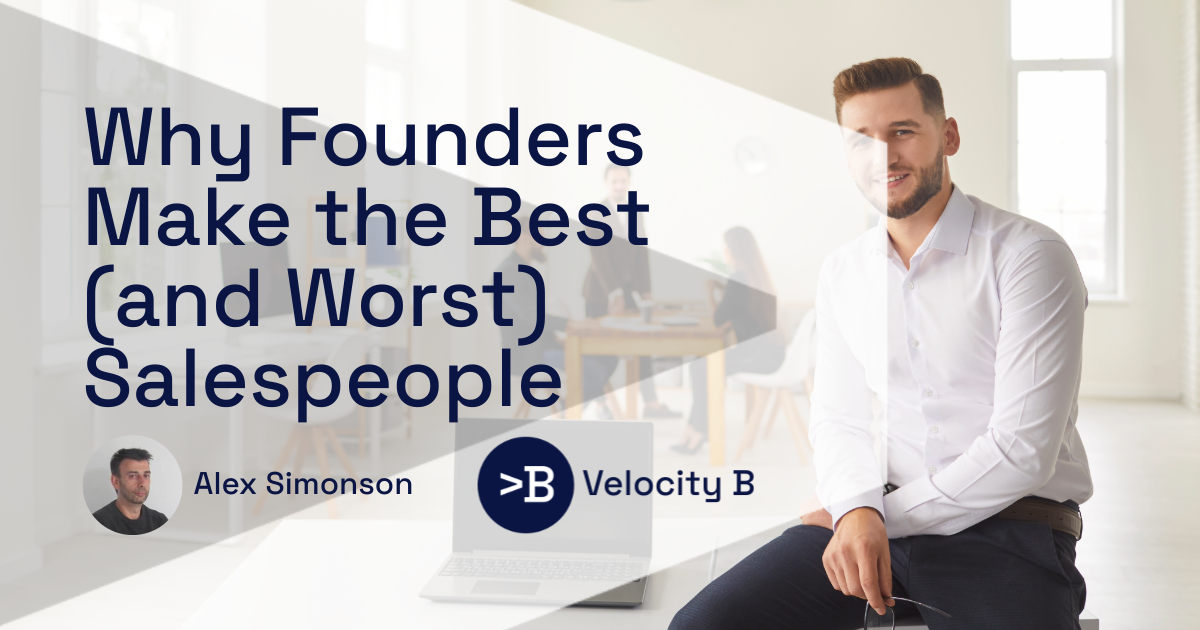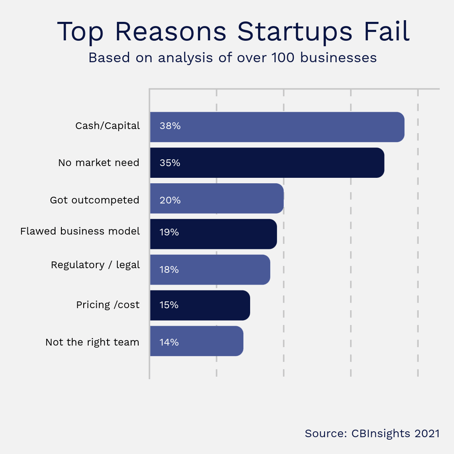Golf course deals are a cliché, but the Ryder Cup inspires Alex to reveal what really drives a sale.

Alex shares how to overcome the three common pitfalls when the founder is the seller.
Founders are typically excellent visionaries and strategists, but this does not necessarily make them great salespeople, and founder-led sales can be a daunting prospect for many B2B SaaS startups, as you're trying to get to product-market fit and have to build a sales process from the ground up.
Since you're still learning, those early-stage sales can be difficult. The sales process requires creativity and continuous iteration, and you will need to avoid the many pitfalls that can arise from having a basic process.
In this post, I will look to share three pitfalls to look out for and how to best navigate them.
Verifying the market opportunity
If there's one particular thing I have seen from working with startups and early-stage growth companies, it's that the initial customer development conversations are focused on validating things from a product standpoint and completely miss out on some of the market and go-to-market dynamics.
One of the top reasons startups fail or struggle to grow is the size of the market opportunity. According to CBInsights, their data shows that 35% of startups fail because they lack a market for their product or service.

So, in order to create, sustain, and grow a viable business, one of the critical factors is adopting a bottom-up approach – thinking about how many of them actually experience the pain point you are looking to address and then calculating what the market size would be. This not only helps in giving you the confidence that you have a viable proposition but will also help in setting realistic (emphasis on the realistic) sales/revenue goals for growth over a period of time.
Build and they will buy… or possibly not
The second pitfall is assuming that because you're solving a real problem, the customer will buy your solution. It sounds pretty logical, but in my experience, that is not actually how things play out.
The most common misunderstanding in SaaS is that you are selling a solution to a customer's problem. In reality, the customer most likely already has a workaround or is currently using a specific method to solve a problem. It's therefore your responsibility to persuade them to switch from their existing method to your more effective one; you are selling change.
One of the core functions of the early sales process is, therefore, the need to understand the buyer and their needs. You need to take the time to define your ICP (Ideal Customer Profile), and as you most likely won’t get it right the first time, this will become an iterative process that builds over time and supports the creation of value propositions, which will in turn underpin your narrative around getting them to buy your solution.
When do you hire sales and marketing people?
And finally, sales is hard….trust me, I have been doing it for 25-plus years (and Ian, my business partner, will tell you that marketing is no different!).
However, it is important for founders to be doing the selling initially because there are a lot of things that could go wrong if you outsource it at the start. Founders need to stay as close to the customer as possible in the early stages in order to determine the initial market fit and build out the solution that addresses the market needs.
So what are the signs to look out for that will determine if you are now in a position to move from founder-led sales to building out a sales and marketing function?
- Solution Market Fit: You have built a solution that delivers demonstrable value to early adopter clients, providing you with the opportunity and proof points to acquire new customers.
- Go-To-Market Fit: Having acquired early adopters, you now need to define a sales and marketing process that is scalable and measurable in order to meet the market opportunity goals you have set.
- Affordability-Fit: Sounds obvious, but you can only hire sales and marketing people when you have the financial resources to do so. I have seen founders look for “commission-only” salespeople, but unfortunately, if you are paying £0 salary, you can expect about £0 worth of work.
Often, founders read a book or a few posts and wonder, “How hard can sales actually be?” You dive right in, talk to a few clients, and bang - your first sale happens! Founders who are driven and have a good product-market fit can typically make a few sales, but what happens after that? Beyond the founder, how does this scale?
To address this, the best-performing startups led by technical or product founders also have advisors who guide them through the early days (and often later years) of their journey – if you want support navigating the pitfalls of sales and marketing, reach out to Ian or me.

Our Managing Partner, Alex, is a seasoned sales leader with over 20 years of experience, driving SaaS and data-led revenue growth strategies.
You can follow Alex Simonson on LinkedIn





